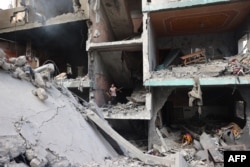U.S. Secretary of State Antony Blinken is set to take part in a meeting in Jordan focusing on how to boost the international community’s humanitarian response for the Palestinians in the Gaza Strip who are badly in need of help after eight months of war.
Blinken will travel to Jordan after talks in Israel with Benny Gantz and Yair Lapid, two centrist politicians, amid a U.S. push for Israel and Hamas to agree to a multi-stage cease-fire deal.
Gantz left Prime Minister Benjamin Netanyahu’s emergency government on Sunday, saying Netanyahu is mismanaging the war in Gaza and putting his own “political survival” ahead of Israel’s security needs.
Lapid expressed support for Gantz, saying on X that the time has come for Israel to have a new government that returns security to the country and secures the return of the hostages held by Hamas in Gaza.
Blinken began his latest trip to the region with talks Monday in Egypt before meeting with Netanyahu.
He said the best way to ensure there are no more civilian casualties is for Hamas to accept the peace deal. Blinken also emphasized the importance of efforts to provide long-term peace, security and stability to Israelis and Palestinians alike, and that the deal on the table “would unlock the possibility of calm along Israel’s northern border and further integration with countries in the region.”
Security Council support
The U.N. Security Council added its voice Monday to calls for Hamas and Israel to implement a permanent cease-fire deal and hostage release in Gaza, voting 14-0 in favor of a U.S.-drafted resolution supporting the cease-fire proposal. Russia abstained from the vote.
“Colleagues, today we voted for peace,” U.S. Ambassador to the United Nations Linda Thomas-Greenfield told council members following the vote.
She said the plan is the best and only way to bring about a durable end to the 8-month-old war, which began with Hamas’ terror attack inside Israel on October 7.
“There is an opportunity to chart a different course,” Thomas-Greenfield said. “Hamas must take it.”
Russia questioned whether Israel has indeed signed up to it and said there have not been enough details about the cease-fire proposal for the council to give its blessing.
“The Security Council should not sign up to agreements with vague parameters,” Russian envoy Vassily Nebenzia said.
The resolution seeks to add pressure on Hamas while urging both Hamas and Israel to fully implement the cease-fire deal “without delay and without condition.” It is also the first time the 15-nation council has called for a “permanent” end to the hostilities.
Israel’s ambassador, Gilad Erdan, was present for the vote but did not stay to deliver his government’s statement. Instead, political coordinator Reut Shapir Ben-Naftaly spoke without mentioning the resolution’s adoption or Israel’s support for the proposal. She urged the international community to put the pressure on Hamas.
“It is Hamas that is preventing this war from ending. Hamas and Hamas alone,” she said.
Following the vote, Hamas issued a statement welcoming that the council has “affirmed a permanent cease-fire in Gaza” and indicating a willingness to engage in indirect negotiations over implementing the principles “that are consistent with the demands of our people and resistance.”
In its initial phase, the three-phase cease-fire proposal calls for a halt in fighting, the release of some hostages from Gaza, the release of Palestinian prisoners held by Israel, a surge in humanitarian aid for Palestinians, the withdrawal of Israeli troops from populated areas of Gaza, and the return of Palestinian civilians to their homes and neighborhoods.
The second phase envisions a permanent cessation of hostilities in exchange for the release of all other hostages in Gaza and a full withdrawal of Israeli troops from Gaza. The final phase includes a multiyear reconstruction plan for the Gaza Strip, much of which has been devastated by eight months of Israeli bombardment. It would also provide for the return of the remains of any deceased hostages still in Gaza.
The October 7 Hamas terror attack resulted in the deaths of about 1,200 people in Israel, mostly civilians, according to official Israeli figures. Hamas militants took about 250 hostages, 116 of whom remain in the Palestinian territory, including 41 the army says are dead.
Israel’s military response has killed more than 37,000 Palestinians, according to Gaza’s health ministry, which does not distinguish between fighters and civilians in its figures.
VOA’s State Department bureau chief Nike Ching and U.N. correspondent Margaret Besheer contributed to this report. Some information for this report was provided by The Associated Press, Reuters and Agence France-Presse.




